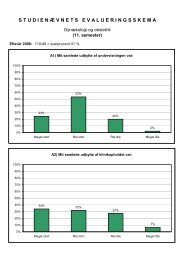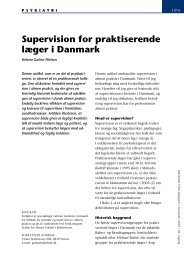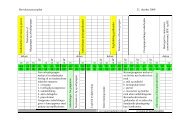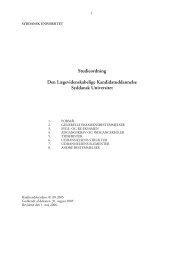shared deliberate practice
shared deliberate practice
shared deliberate practice
Create successful ePaper yourself
Turn your PDF publications into a flip-book with our unique Google optimized e-Paper software.
Shared Deliberate Practice 227Ericsson, K. A. (2006). The influence of experience and <strong>deliberate</strong> <strong>practice</strong> on thedevelopment of superior expert performance. In K. A. Ericsson, N. Charness, P. J.Feltovich, and R. R. Hoffman (Eds.), The Cambridge handbook of expertise and expertperformance (pp. 685-706). Cambridge, UK: Cambridge University Press.Ericsson, K. A. (2007). Deliberate <strong>practice</strong> and the modifiability of body and mind: toward ascience of the structure and acquisition of expert and elite performance. InternationalJournal of Sport Psychology, 38, 4-34.Ericsson, K. A., Krampe, R. T., and Tesch-Römer, C. (1993). The role of <strong>deliberate</strong> <strong>practice</strong>in the acquisition of expert performance. Psychological Review, 100, 363-406.Ericsson, K. A., and Lehmann, A. C. (1996). Expert and exceptional performance: Maximaladaptation to task constraints. Annual Review of Psychology, 47, 273–305.Ericsson, K. A., Prietula, M. J., and Cokely, E. T. (2007). The making of an expert. HarvardBusiness Review, 1-7.Ericsson, K. A., and Simon, H. A. (1980). Verbal reports as data. Psychological Review, 87,215–251.Ericsson, K. A., and Smith, J. (1991). Prospects and limits in the empirical study of expertise:an introduction. In K. A. Ericsson and J. Smith (Eds.), Toward a general theory ofexpertise: prospects and limits (pp. 1-38) Cambridge: Cambridge University Press.Flyvbjerg, B. (2006). Five misunderstandings about case-study research. Qualitative Inquiry,12, 219-226.Helsen, W. F., Starkes, J. L., and Hodges, N. J. (1998). Team sports and the theory of<strong>deliberate</strong> <strong>practice</strong>. Journal of Sport and Exercise Psychology,20, 12-34.Henriksen, K. (2010). The ecology of talent development in sport: a multiple case study ofsuccessful athletic talent development environments in Scandinavia. Odense: Universityof Southern Denmark.Hodges, N. J.,and Deakin, J. (1998). Deliberate <strong>practice</strong> and expertise in the martial arts: Therole of context in motor recall. Journal of Sport and Exercise Psychology,20, 260-279.Hodges, N. J.,and Starkes, J. L. (1996). Wrestling with the nature of expertise: A sportspecific test of Ericsson, Krampe and Tesch-Römer's (1993) theory of <strong>deliberate</strong> <strong>practice</strong>.International Journal of Sport Psychology,27, 400-424.Jenkins, S. (2010). Digging out the dirt: Ben Hogan, <strong>deliberate</strong> <strong>practice</strong> and the secret. AnnualReview of Golf Coaching,4, 1-21.Jones, R. L., and Wallace, M. (2005). Another bad day at the training ground: coping withambiguityin the coaching context, Sport, Education and Society, 10, 119-134.Kvale, S., and Brinkmann, S. (2009). Interviews: Learning the craft of qualitative researchinterviewing. Los Angeles: Sage Publications.Mohammed, S., Tesler, R., and Hamilton, K.(2012). Time and team cognition: Towardgreater integration of temporal dynamics. In E. Salas, S.M. Fiore, and M.P. Letsky (Eds.),Theories of team cognition: Cross-disciplinary perspectives (pp. 87-116). London:Taylor and Francis/Routledge Academy.Ronglan, L. T. (2009). Situert læring: om laget som praksisfellesskap. In L. T. Ronglan, A.Halling, and G. Teng (Eds.), Ballspill over grenser: skandinaviske tilnærminger til læringog utvikling(pp. 35-47). Oslo: Akilles forlag.
















